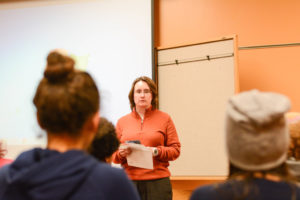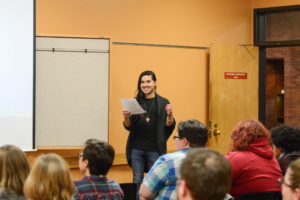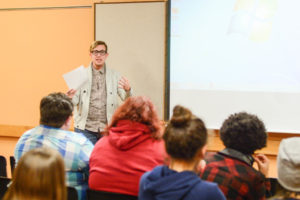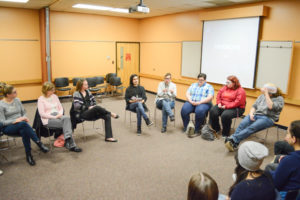By Da’Sha Tuck, Staff writer
Facing difficult discussion topics such as white privilege, gender/socioeconomic stereotypes and oppression in minority groups, a workshop sponsored by the office of LGBT Programming was held at the Curris Center last week.
The lecture was entitled Dismantling Our Legacy of White Supremacy and looking at flyers and social media advertising for the event, students originally got the impression the event would be a lecture.
“I was pleasantly surprised at the open forum and discussion about these hard-hitting issues,” said Shannon Hicks, senior political science major from Louisville, Kentucky. “It really allowed a diverse amount of opinions and topics to be covered and created a safe atmosphere to have intelligent conversations about these issues.”
The Speakers and Their Project
America in Transition is a documentary series and campaign focusing on social change from the perspective of transgender individuals.
The event featured two speakers: Lexington L. Lawson, facilitator and booking manager of America in Transition, and Karari Olvera-Orozco, facilitator, producer and advisory board member of America in Transition.
This documentary is set to release this year. Director Andre Perez began this journey seven years ago when he decided to travel across the country to document real life issues transgender individuals face. Through the documentary, Perez encounters a suicidal veteran, a child battling their school and more. More information on this project can be found at americaintransition.org.
Creating an Open/ Safe Environment
The workshop began with an “ice breaker” led by the two speakers. The attendees were asked to take turns telling the group their name, major and the first time they had ever experienced oppression.
This activity plunged the workshop into the meat of the discussion very quickly.
“It was very interesting to hear everyone’s stories about their first memories of oppression and how many times people expressed not knowing why they felt uncomfortable, but knowing what they were experiencing was wrong,” said Charley Allen, Murray State University web manager, a member of the LGBT Programming advisory council.
Lawson and Olvera-Orozco set strict guidelines for the workshop. Those included: always assume best intentions, practice active listening, confidentiality, the use of “I” statements and respect.
Lawson said her work has been rooted in dismantling and unraveling the “us versus them” concept.
During the workshop, Lawson and Olvera-Orozco addressed categories in which people are placed based on gender, sexuality, class and ability and how those categories interact with the concept of white supremacy.
“Part of the conversation was around the idea that white supremacy is intersectional,” Olvera-Orozco said. White supremacy is also impacted by the condiments (gender, sexuality, class and ability) that we discussed. White supremacy is conditional.”
Whether or not living in an “anti-racist” world is a feasible concept was also discussed during the event. Lawson and Olvera-Orozco had a strong opinion.
“I think it is necessary. We (humans) will either evolve or perish because of the violence and pain that are caused by these ideas and restrictions,” Lawson said.
Olvera-Orozco said she believes an anti-racist world can be achieved. She said it is about empowering marginalized communities.
This event pulled attendees out of their comfort zones, but that is what it takes to grow and create change, Hicks said.
“I think it is very important to continue having conversations about privilege and to identify the various social constructs that are used to keep people oppressed,” Allen said.
Hicks said although the idea of an anti-racist world is exciting, she does not believe it is feasible especially with “our current political climate and current presidential administration and the continuing police brutality across the nation”.
Change starts now with workshops like these, said Lawson.
“Having these types of panel discussions are very important and vital to creating a large knowledge of understanding, and I thought the workshop was interesting because it incorporated the LGBT community,” Hicks said. “As an ally, to the LGBT community, it really allowed me to understand the impact of white privilege in the community.”
Photos courtesy of Chalice Keith/The News



